Our joint investigation with the InformNapalm international investigative community based on the website and search analytics revealed that a range of news websites are interconnected not only by similar topics and pro-Russian narratives but also by mutual citations and referral traffic from one site to another, as shown on the infographics.
Click on points to get a brief info and see links with other points (sites), and drag to top in the middle of the screen for better view on mobile.
The websites on the list have different levels of bias, from constant criticism of the West, choosing only negative information about Ukraine and positive coverage of Russia, to spreading well-known Russian fakes and harsh Kremlin propaganda quoting Putin’s state media. The most radical sources also propagate global conspiracy theories, stigmatize the West and its political leaders, and predict its collapse.
For example, in Europe, especially in Germany and France, a whole network of websites has developed that in various ways support the Kremlin’s agenda or openly spread Russian propaganda and demonize the United States, the EU, and the collective West.
Almost all of these pro-Russian resources publish on a standard set of topics: positive coverage of Russia, justification of its full-scale invasion and war against Ukraine by Kremlin media propaganda and fakes, “Nazis in Ukraine,” “bombing of Donbas,” and “self-defense” against “NATO’s eastward expansion.”
Most of them claim that Russia will inevitably win and defeat Ukraine. In order to increase Moscow’s chances of success in the war of aggression, Putin’s supporters criticize the weapons supplies to Ukraine, without which the Russian invaders would capture even more Ukrainian towns and villages. On the other hand, these sites frequently criticize Western countries, along with their respective governments, while also providing positive coverage and even promoting protest movements in Europe.
Such authors blame the West and NATO for all the troubles, often promoting conspiracy theories and disseminating the opinions of “pseudo-experts” about the decline and imminent fall of the United States, the European Union,. Such authors are expected to favorably comment on former US President Donald Trump, who is trying to return to power and makes controversial statements favorable to the Kremlin.
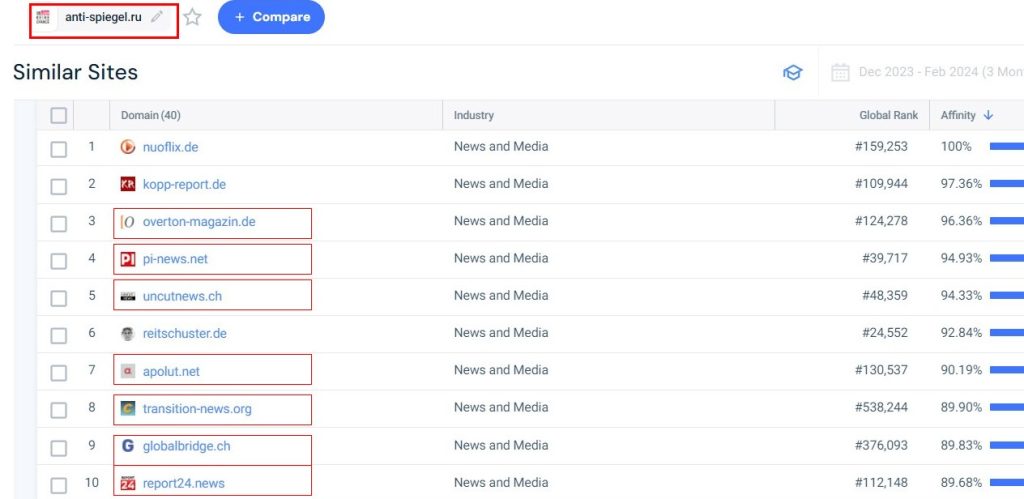





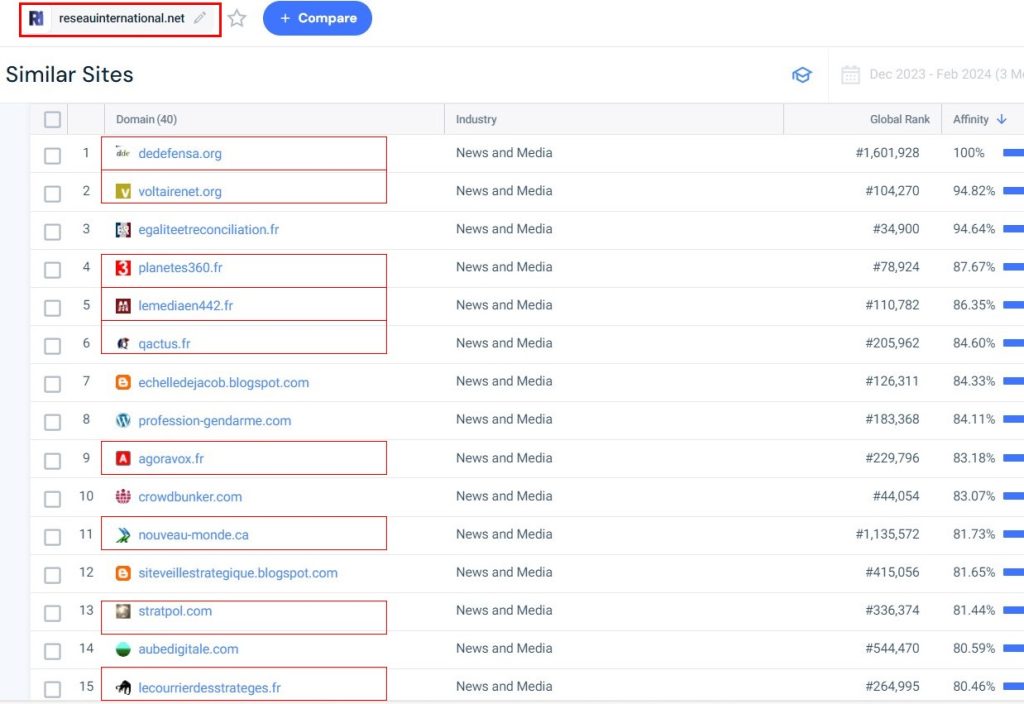


To gain more credibility, these sites include pretentious and trendy words in their titles: geopolitics, diplomacy, strategy, research, globalization, freedoms, the new world, investigation, media for all, crises, uprisings, resistance, investigation, info-war, politics, world network, columnists, etc. Of course, there is also the banal “truth” in the Russian style. Of course, boastful names like “strategic policy,” “deep geopolitics,” “diplomatic world,” “new world,” or an “international network” carefully conceal pro-Russian views and anti-Western criticism in their “political-strategic,” “analytical-geopolitical” studies, or “geopolitical-diplomatic” reviews.
To attract attention and inspire trust, many of these outlets position themselves as alternative sources of information while at the same time criticizing the country’s mainstream media, accusing them of being biased in favor of the government or “globalists.”
Instead, they deliberately overlook not so much bias as disinformation and propaganda in the Kremlin state media they cite. Alternative content on these websites typically consists of conspiracy theories, pro-Russian propaganda fueling the ongoing conflict in Europe, and misinformation.
Notably, many of these sites promote far-right and right-wing radical parties, as well as far-right politicians, who are almost universally known for their pro-Russian stance or for making statements favorable to Putin. Another category of pro-Russian websites has, on the contrary, left-wing radical views and communist sentiments (they either believe in the anti-Nazi fables of Putin’s propaganda or have a fascination and nostalgia for the former Soviet Union, whose history is full of mass executions and mass forced deportations to Siberia and the Gulags of all those who disagreed with the communist dictatorship).
For the Putin regime, it makes little difference whether a website or politician is far-right or far-left; the main thing for Russia is to push its narratives and disinformation to European audiences. The Kremlin considers the media and politicians from both camps to be “useful idiots.” They help spread disinformation and division in European society, as well as influence public opinion for free (some probably not). As long as they are weakening the EU and undermining Europe’s unity, it suits the Kremlin.
Russian propaganda also utilizes these “foreign” media outlets for the “domestic market,” quoting and convincing the Russian audience of support for Russia in Europe and alignment with Russian state media narratives. As a result, many of the websites on the analyzed list received quotes from Russian state media.
Most of the pro-Russian influencers quoted by these outlets are already well known; some of them were even presidential candidates or leaders of small or medium-sized parties in EU countries.
Thus, the EU banned the Kremlin’s leading propaganda resources, RT and Sputnik, leaving Moscow to rely on a whole cohort of friendly or biased websites. Moreover, after the sanctions against Russian state-owned media, which French President Macron openly called propaganda organs, were adopted, multilingual online media with almost identical to Russia Today content appeared in Europe, particularly in France.
Methodology for identifying pro-Russian websites with similar content
In order to easily identify websites that publish materials that are favorable to the Kremlin and spread pro-Russian narratives, it is necessary to use web analytics programs (Seranking) and keyword and semantic analysis to identify those that publish materials on topics that are typical for Russian media. Propaganda sites use common terms that help us identify which sites are ranked and receive search traffic.
At the same time, semantic analysis of website content and keywords allows us to identify similar sites that are also potentially carriers of pro-Russian and anti-Western narratives.
The next step is to identify hyperlinks between these websites. Seo-tools that record all backlinks between sites, as well as citations of site materials or specific articles or keywords, assist with this. Simple numerical analysis and filtering allow you to determine which sites have regular citations and publish external links from one site to another.


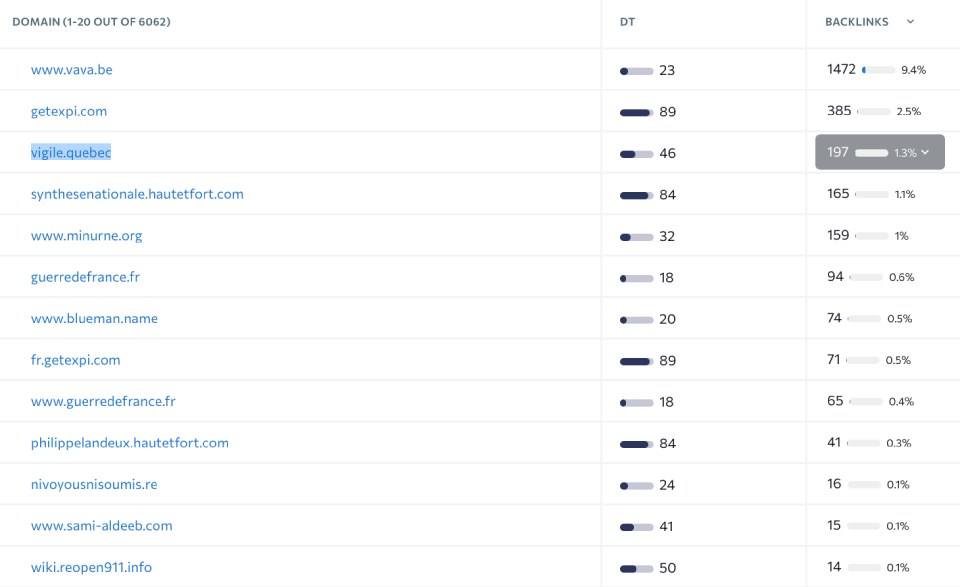

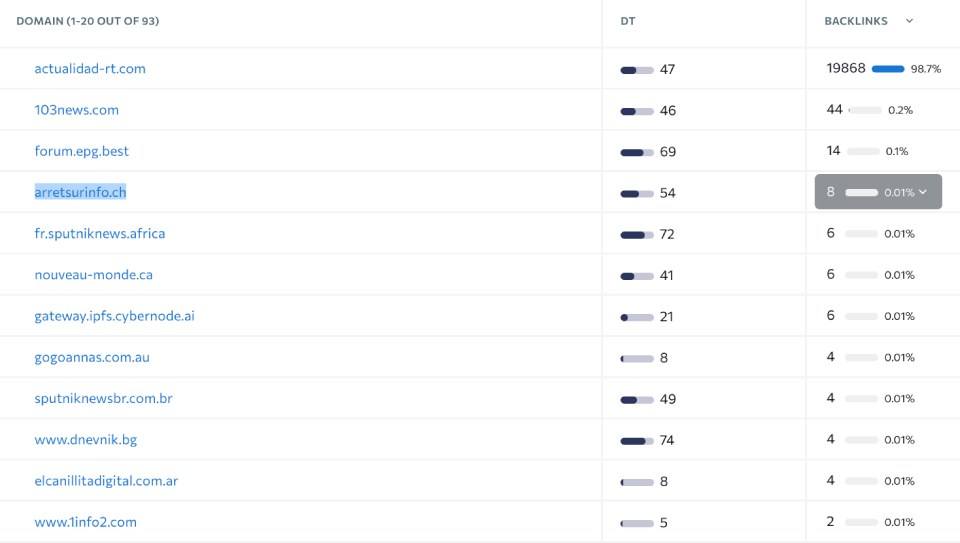



An additional way to identify or confirm pro-Russian sites is to see whose publications are liked by Russian state media and thus by Putin’s propaganda machine. Checking external links from Russian state media (Tass, RT, Ria, Lenta) to German, French, or international news sites helps to quickly identify whom Russians are quoting to support their critiques of the West and Ukraine.
And if all three factors come together—websites have similar content, rank for the same search terms (which hint at a pro-Russian narrative), and link and quote each other—there is no doubt that they share common goals.
To make sure that these sites also share a readership, we used SimilarWeb to look at the referral traffic of the largest of them. As expected, we found that these citations are not in vain; they are being followed by a live audience that is pro-Russian, Eurosceptic, anti-Western, and has a tendency to believe in conspiracy theories. There is constant user traffic between the sites in the identified network. And these are not isolated cases, proving the accuracy of the analysis and conclusions.







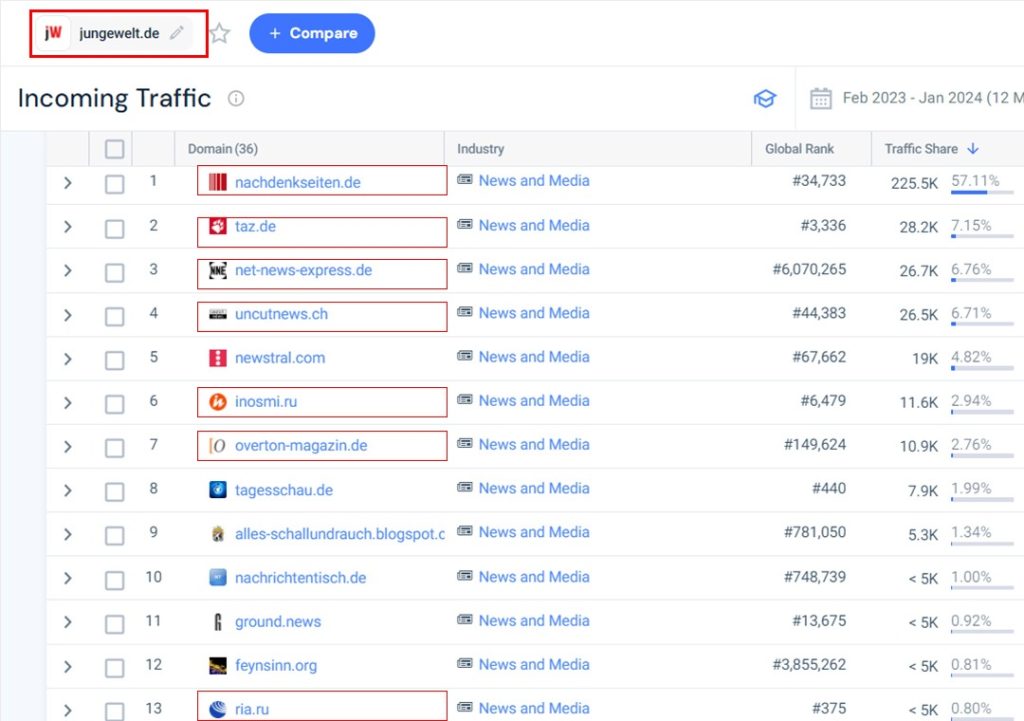














Having put together all the data on the links between such sites, we visualized these networks and the connections and referral traffic between them using the Flourish platform. The infographic reveals dense coverage of anti-Western and pro-Russian websites in Europe, particularly in France and Germany. It has also spread to Slovakia, the Czech Republic, Switzerland, Austria, and other continents, to Canada, India, and Africa. However, given the scope and scale, this list is not exhaustive and requires additional research and analysis, as the threads on the web lead to more and more sites.
Why is it important to know about the connections between pro-Russian and anti-Western websites? To understand the importance of working in an organized and purposeful manner in the information field to support Russia’s efforts in its full-scale war against Ukraine and its campaign of disinformation targeting Europe, aiming to sway public opinion, weaken governmental authority, and spread despair and chaos.
Moscow’s goal would be to bring radical forces, with whom it has warm relations, to power. This issue has become especially threatening a few months before the European Parliament elections.
Such sites have a much greater influence than the network of pro-Russian sites with the Russian word “pravda” in their domain name or the network of fake pages and Kremlin bots on social media that were recently discovered. After all, these networks either had a short period of existence, reached only a small audience, or were not credible in themselves.
On the other hand, people already consider classic Russian state media as compromised and untrustworthy propaganda outlets. Instead, sites with a longer history of publications, a specific audience, and a format that resembles other Western media are able to convince more readers of their narratives.
Experts and EU states should monitor the activities of such sites, and readers should question such content because efforts that favor Russia in the information field in times of geopolitical confrontation play into the hands of the Putin regime and are detrimental to Europeans. After all, Russia has shown that it is waging not only a war on the battlefield to destroy Ukraine but also an information war to break up a united Europe.
